List with all the PARTS of a FABLE
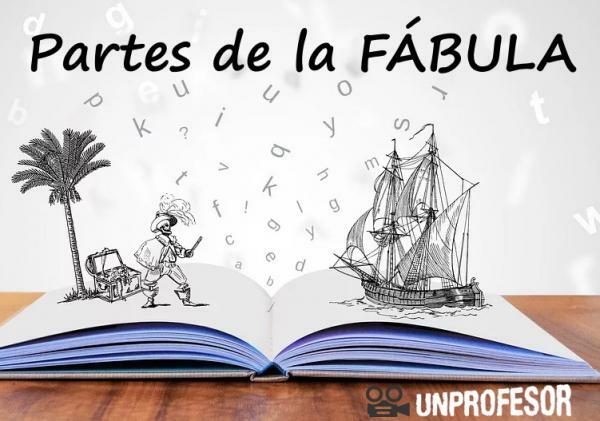
The fable it's a kind of literary subgenre which is specially designed for the little ones to adopt good attitudes and behaviors in life. It is a type of short story that has an ethical and didactic intention and that is carried out by animals or inanimate objects. In this lesson from a TEACHER we are going to discover you all the parts of a fable so that you better understand the structure of the fable and you can know the most important characteristics of this type of story.
Index
- What is a fable: definition for children
- All the parts of a fable
- Elements and structure of the fable
What is a fable: definition for children.
Before we start talking about the parts of a fable we have to understand what is a fableand, thus, we will better understand what type of literary text we are dealing with. A fable is a short story that can be written in both prose and verse and where the main characters are either animals or inanimate objects that have human characteristics.
It is a type of literary subgenre that has a didactic intention since its objective is to transmit a value, an idea, a mode of behavior, and so on. In order to correctly spread this intention, the fable closes with a moral, the final learning that has been reached after the experiences related during the narration.
Due to the didactic nature and the construction of such fanciful characters, fables are usually directed to a child or family audience. However, over the years, literary genres have been expanding and, today, we have many fables that are for all types of audiences. Some of them can be seen in cinematic language with productions like Shreck.
Fables characteristics
For you to better understand what a fable is, we believe that it is important that you know the main characteristics of this type of literary text. The most prominent are the following:
- Starring animals or inanimate objects that have characteristics of human beings
- Didactic intention which is compiled at the end of the narrative with a moral or teaching
- Simple structure: the objective is to transmit a teaching and, therefore, the fable has a simple structure where a narrator tells the story in a linear way
- Short story: It is another of the characteristics of the fable since they are usually short stories, stories, which are explained for educational purposes
- Subgenre with a lot of tradition: in fact, fables from Mesopotamian times were found in which the protagonists were cunning animals
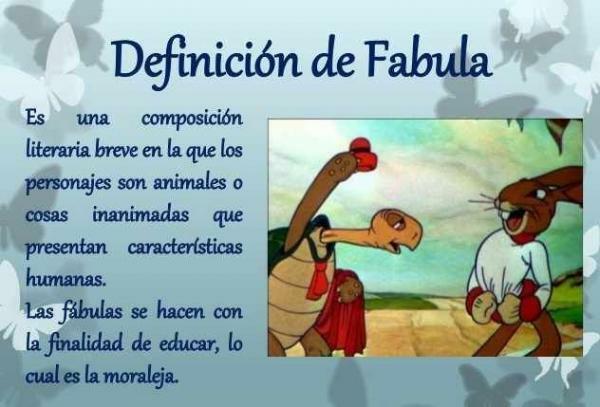
Image: Pinterest
All parts of a fable.
But let's get into the matter now to know what the parts of a fable are. As we have commented, it is a short story and, therefore, its parts closely match the parts of the story but with some particular variations. Here we leave you a summary of all the parts of a fable so that you know them better.
Introduction
The first of the parts of a fable is the introduction, that is, the presentation of characters, time and place in which we find ourselves. It is about the beginning of the story where we are presented with the initial situation of the plot and the characters that will participate in it.
Knot or development
It is the part in which that first introduction undergoes a change that alters it. Namely, it's about action, of the problem that takes place in history and where the protagonists must act to try to return to normality or, at least, solve the situation. This is when the narrative reaches its most intense point since the characters will find themselves in a tight spot and will have to put themselves to the test to be able to solve the situation.
Outcome
Another part of a fable is the denouement or end, that is, the way in which it ends up being solved the conflict that has arisen in the knot and that has harmed the lives of the characters. Therefore, we are facing the solution of the problem, the way in which the central conflict of the narrative is resolved.
Moral
This is the most characteristic part of the fable since is unique to this narrative subgenre. As we have already said, this type of narration has a didactic intentionality, that is, it wants to impart a teaching that is reflected during the story. However, so that this final learning is not lost, at the end of the story this conclusion or moral is incorporated that gathers the final reflection to motivate learning.
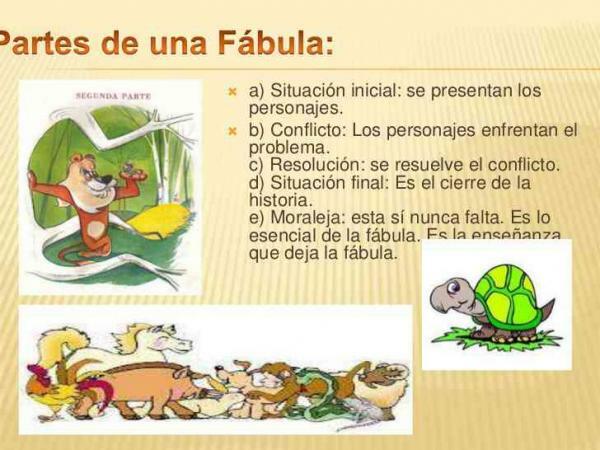
Image: Partsof
Elements and structure of the fable.
And now that we have known all the parts of a fable, we are going to focus on the elements and structure of this type of short story. Here we will analyze the basic aspects that interfere in the elaboration of these narratives.
Narrative space
It is the place selected by the author for the plot to unfold. Depending on the type of story in which we find ourselves, this place may or may not be fantastic. However, since the vast majority of fables are carried out by animals, the space usually takes place In nature (forests, seas, meadows, etc.).
Storyteller of the fable
We have already commented that one of the characteristics of fables is that they are simple texts since the objective is to instruct and transmit a message that is clear and concise. Therefore, normally the narrators are omniscient, that is, in the third person, the narrator "God". Although there may be a narrator in the first person, it is usual for it to be in the third person.
Fable structure
We have already indicated the parts of the fable above and, therefore, we can see that the structure is usually linear (presentation> knot> outcome> moral), something that facilitates the understanding of the message by readers. However, it can also be the case that the order is altered although it is not very common.
Topics
The topics on which the fables speak can be many and varied. However, in general, it is committed to treating universal themes like what the Greek authors did with their tragedies. Topics such as lies, arrogance, friendship, selfishness, kindness, etc. are discussed. The objective is to show the human vices and virtues so that the little ones learn good behaviors.
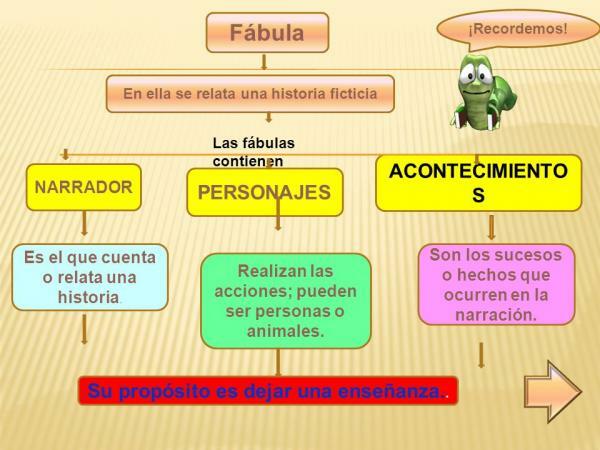
Image: Slideplayer
If you want to read more articles similar to Parts of a fable, we recommend that you enter our category of Literary concepts.

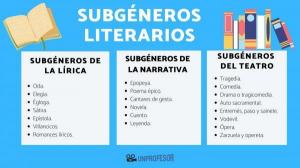

![All SUBGENERS of the DRAMA genre: older and younger [SUMMARY !!]](/f/8066bbe44ef24320ce85203d444172b6.jpg?width=300&height=200)